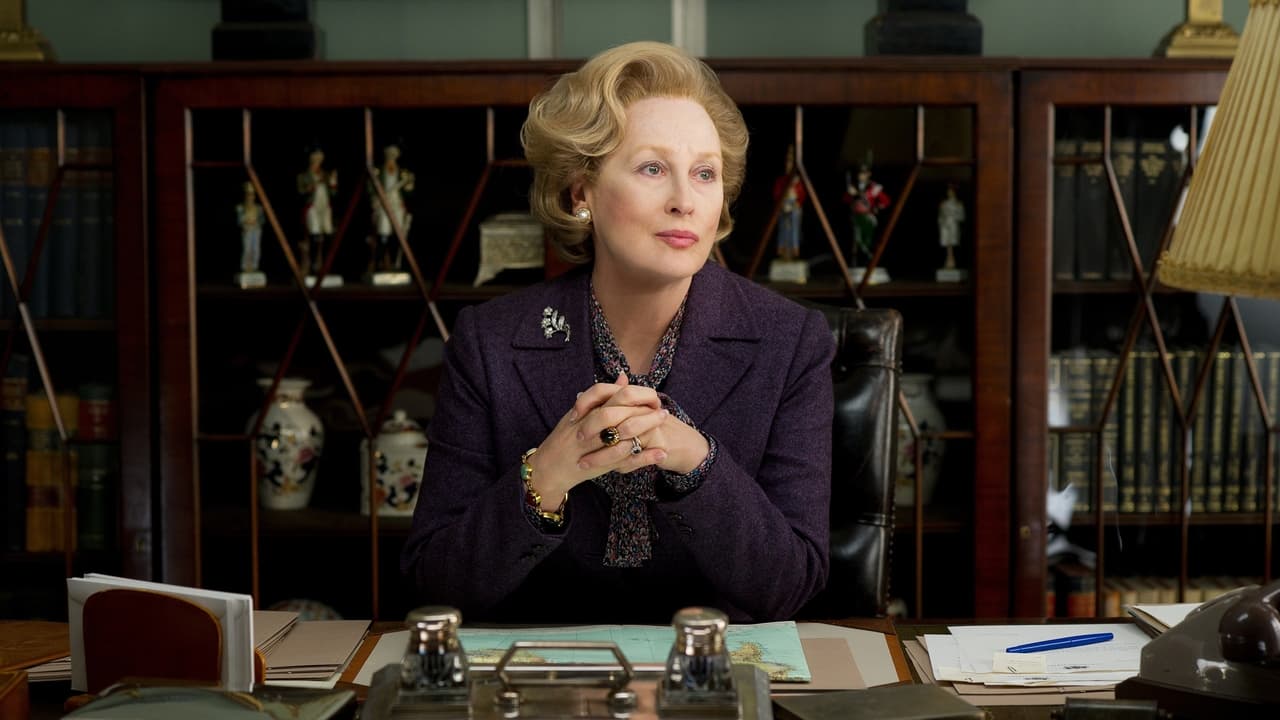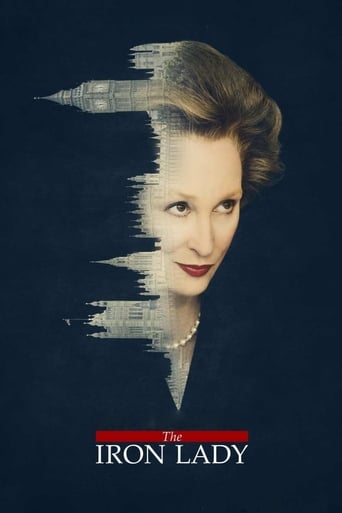

Sometimes a movie should be about the person, not the history. That is what a lot of people are missing. This is a unique chance to make a movie about someone well known who has dementia and how it might manifest itself in them. We saw Margaret as a politician, but not as a person who had trials of her own. I disliked her politics and really didn't want her policies lauded and praised, but it was interesting to see the woman herself.
... View MoreMeryl Streep in her Oscar-winning turn as Margaret Thatcher (1925-2013), the longest-serving Prime Minister of the United Kingdom, who, after winning the 1979 general election after serving as Secretary of State for Education and Science in former Prime Minister Edward Heath's Cabinet, led the Conservative Party with a iron fist--teacup often in hand. Handsome, commanding film, complete with wistful remembrances from old age and the ghost of Margaret's deceased husband Denis (Jim Broadbent), puts a great deal of responsibility on Streep's shoulders, yet she carries the role off with aplomb. Director Phyllida Lloyd and screenwriter Abi Morgan are not afraid of using humor to tell Thatcher's story--and, conversely, they do not shy away from Thatcher's controversial political decisions, her impatient manner, persnickety stubbornness and unflappable nature while facing her many judges and adversaries. All involved have done a great deal of study here, and Lloyd is effective in making the elderly Thatcher a sympathetic woman full of memories who nevertheless will not go quietly into the night. The balance here--the despised woman and the headstrong lady leader who abhorred weakness--is carefully weighed. While the film isn't intrinsically exciting as an entertainment, it is a sterling showcase for its leading lady. **1/2 from ****
... View MoreIn the 80's, French singer Renaud signed a famous musical tribute to women, praising their natural lack of involvement in men's ugliest passions: hooliganism, gun, violence or cars... Refrains ended the same: "no chick is a hooligan, nor imbecile nor murderer, no, not even in Britain except, of course, Mrs. Thatcher" or "no woman is wretched enough, to polish a revolver, and feel herself invincible except, of course " well you got the point. You can find the song on Youtube with English subtitles.So, it's not just that the aura of Mrs. Thatcher exceeded the limits of the British Channel and turned her into the punching ball for left-wing artists from all over the world, it is the rhetorical harshness. Basically, Miss Maggie (which is the title of the song) was an exception among all the distinguished members of the female persuasion, Renaud could go as far as considering any woman a goddess but in the case of MT, he'd make an exception. That this woman managed to elicit the same disdain than a man says everything about her polarizing power. Like her or not, she didn't steal her nickname.She wasn't an iron fist in a velvet glove, Miss Maggie was an all-iron personality who expressed her conservative beliefs to the fullest, convinced that salvation and greatness lied in a sane philosophy of hard-work and profit, no matter how small they were, opportunities were to be encouraged. She rejected laziness, complaining and reliance on state as non-British values, and as a war witness and the daughter of a modest grocery shop owner who believed in the virtue of property and entrepreneurship, even in the midst of the Blitz, she never compromised, for better or for worse.So from 1979 to 1990, perhaps the most difficult time of recent British history, marked by the Winter of discontent and severe economical recession, she became the most divisive yet longest-serving Prime Minister of British history, also the most significant after Churchill. Her initiatives caused many strikes from public service unions and workers from state-owned companies, the most infamous one involving the miners, she was also confronted to IRA bombings and had lead Britain during the infamous Falklands War in 1982, she was also known for her allergic defiance toward European Union and the Brexit seems to have proved her point posthumously.Now I grew up knowing her name, later her feats from history and a few documentaries, but I really expected the movie to provide the kind of anteroom's insights you expect from political biopics. I wanted it to tell me something I didn't know. Well, I didn't know how serious was Mrs. Thatcher's condition during her senile days, while she was still coping with the loss of her husband and number-one fan, but as much I didn't know it, I didn't care either. Yet, believe it or not, this represents almost two thirds of the film, the rest shows more her rise to power than its very exercise, and all the events I just related are all showcased in telegraphic style with no scenes whatsoever that could have completed our historical knowledge.Meryl Streep won the Oscar for the role and she was exceptional, but all the acting, accents, make-up and mannerisms in the world can't save the film from its incomprehensible obsession with Thatcher's dementia, the approach taken by Phyllida Lloyd, director of "Mamma Mia!" and writer Aby Morgan. Is it because her portrayal was so unflattering that this pathetic condition was supposed to elicit our sympathy? Well, then how about showing the extent of her determination, the controversial nature of her tenure and not without being too dependent on lazy editing made of speeches, applause, footage of strikes... they were so repetitive it became almost comical.Or was it to show that "behind every great woman, there's a man" and Mr. Thatcher's death was just too much to take? Well, then show their relationship before his death, during her political reign. All through the film, we see Jim Broadbent as a lovable buffoon popping out of nowhere like a hallucination but it was so awkward it didn't add much to the movie. There's one scene where she decides to become Prime Minister and he complains that she doesn't spend more time with her family. I don't care if it's true, this scene and the one where she drives away from her kids, was implausible beyond words.Unfortunately, for a woman who insisted that action mattered more than anything, who regretted that people care for feelings more than ideas, there's nothing that shows the genesis of Thatcherism, as ideas or action, nothing against her chemist worker period. It's just the housewife/woman aspect and the Meryl show, where she's more notable as playing a senile lady than the iron one. Her arc doesn't close when she resigns and sees how Britain has improved by being one of the major powers of the world but when she finally gets rid of her husband's clothes. That's it.Streep isn't to blame; it's a waste of talent but film lack a direction and a vision, in a three-hour film, the Alzheimer bit could have worked but not in a short run-time. And the most infuriating part of it is that there has been a lot of talking about the status of Miss Thatcher as a feminist icon and God knows how Meryl loves playing empowering women, but there's not one hint of empowerment in this film, it's all about the debilitated years of Thatcher, nothing else. For once that I expected a real film about women of power, much more from a female director and writer, we have a case of shocking incompetence.The film came at a right moment where she could be judged in all perspective, far from the hysteria that she caused later. But I'm sure even Renaud himself would think "Miss Maggie" deserved better, especially at her lifetime.
... View MoreMargaret Thatcher was a fascinating if controversial woman, who has garnered strong opinions on either side. 'The Iron Lady' also boasted quite a cast, with the likes of Meryl Streep and Jim Broadbent, what could go wrong? The answer is, a lot did. 'The Iron Lady' is not complete dreck, but it could have been much, much better and doesn't do justice to Thatcher at all. The best thing about it is the acting, with the star of the film undoubtedly being the miraculous central performance of Meryl Streep as Thatcher. This is not a caricature or an impersonation, this performance feels genuine and real, showing that Streep did her homework researching Thatcher and her mannerisms.Jim Broadbent brings heart and warmth to the ghostly Dennis, in lesser hands this could have been a gimmick but Streep and Broadbent's chemistry is quite heartfelt and really tries to bring believability to scenes not deserving of that effort. Alexandra Roach is also solid as is an unrecognisable Olivia Coleman. Other than the acting, the make-up is extremely good with the actors very believably made up, the locations and costumes are suitably evocative and there is the odd intriguing scene that are too far and between.It is such a shame that the rest of 'The Iron Lady' falls flat. The supporting/secondary roles consist of spot and recognise the actor but the roles are too sketchily developed and under-utilised to make a proper impression. Phyllida Lloyd's talents as a theatre director don't translate here, here her direction is elephantine and the film is often haphazardly filmed and chaotically edited, especially the flashbacks. Thomas Newman's score is not among his best work, it's not awful certainly but it's more dreary than hypnotic and too derivative of other and better scores of his. The use of Beethoven's "Emperor" Concerto is moving though.Narratively, the story is unfocused and chaotic. There is too much focus on the older Thatcher suffering from dementia, and the scenes which dominate the film are incredibly dull and repetitive, there was little interesting about them, they seemed to exploit this awful condition with little sympathy for it rather than make Thatcher interesting and says little about her as a person and it was very difficult to not tire of the film early on. Much more interesting events, especially what Thatcher was famous for and conflicts of the time, are either mentioned but glossed over, introduced but quickly given short shrift or omitted entirely. In the end, hardly anything is learnt about Thatcher as a person or what made her famous or important and we don't really care at the end of the day.Similarly, the script is also very sketchy and stilted with too much focus on the wrong things and more interesting elements severely underdeveloped or out of sight. It also seemed too careful not to offend, while it can be appreciated that the film didn't want to make Thatcher an angel or a villain or be one-sided it just felt like things were played too safe and like the writer Abi Morgan couldn't decide what her opinion on Thatcher was. She was a controversial figure certainly, but there was room for a complex characterisation and while Streep's performance is without complaint and that didn't really come.Overall, a pretty weak film saved by the acting, Streep is the star here and issues about her winning the Oscar are none. 4/10 Bethany Cox
... View More